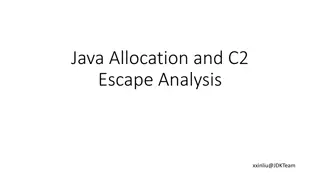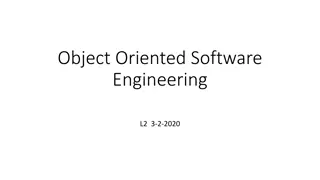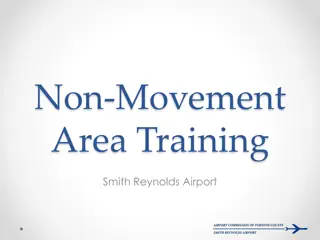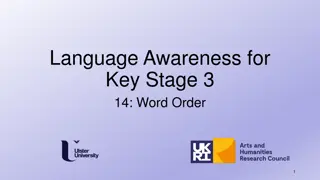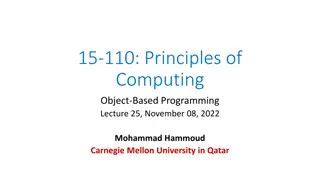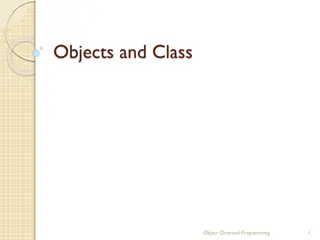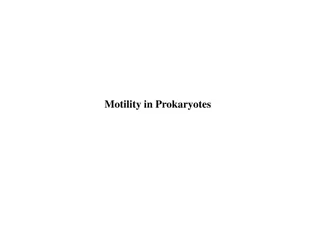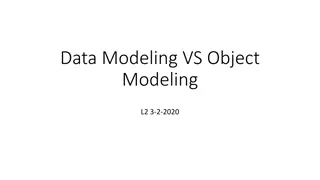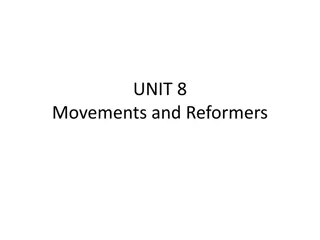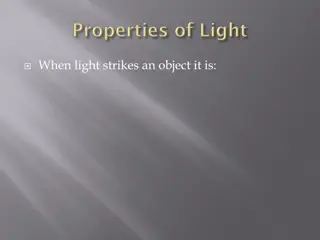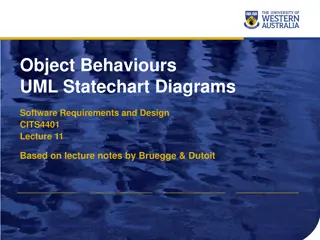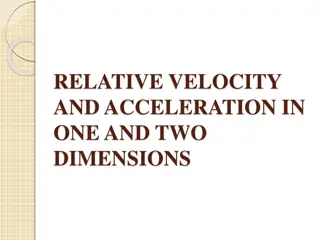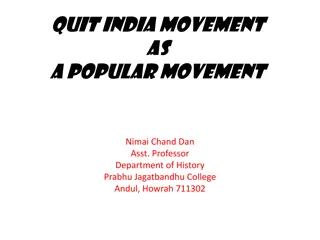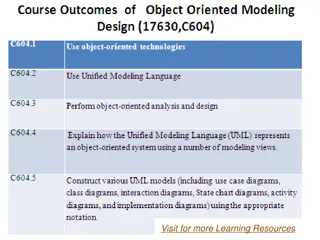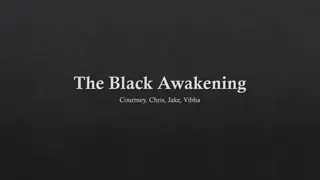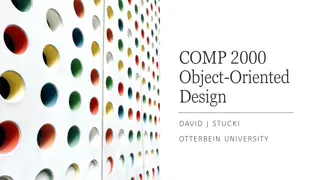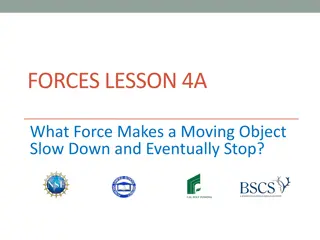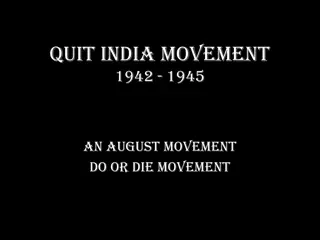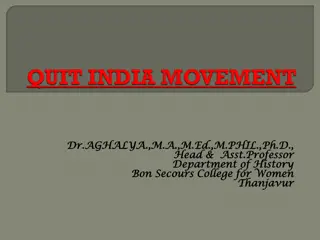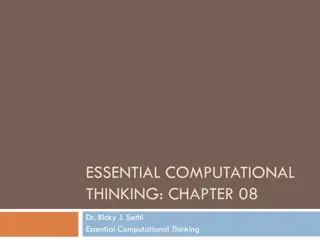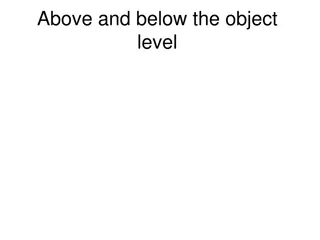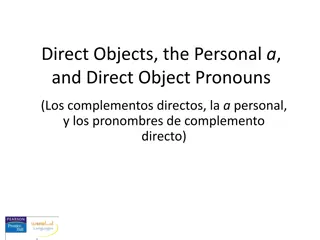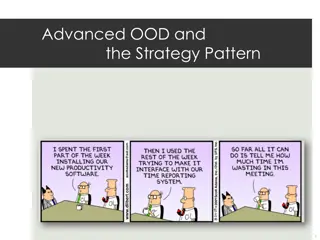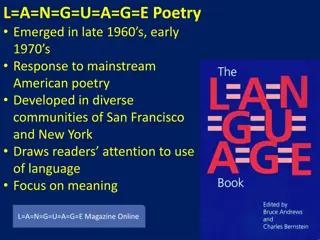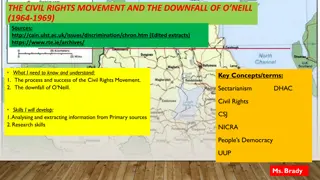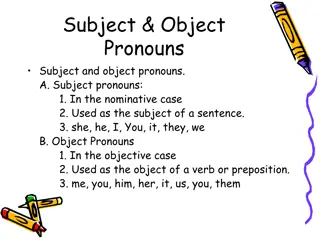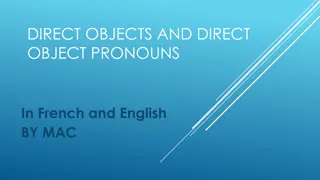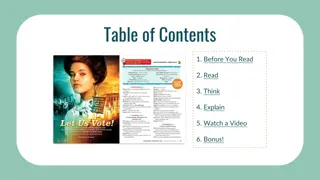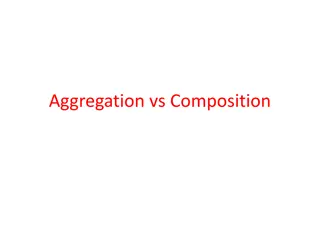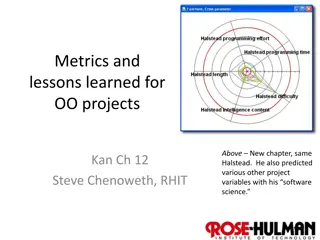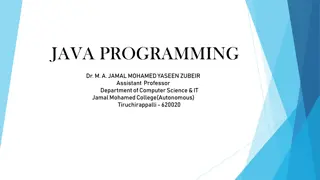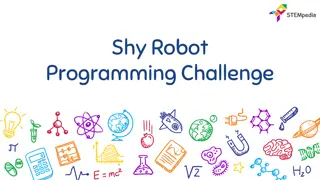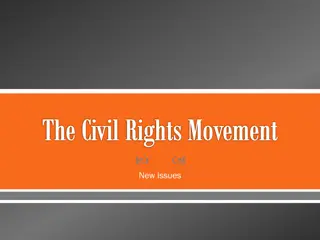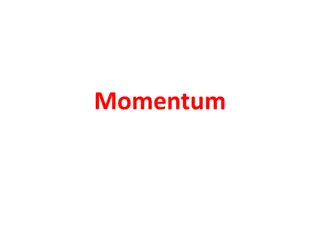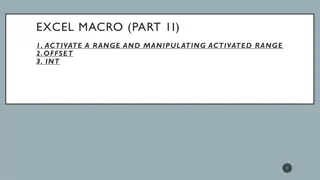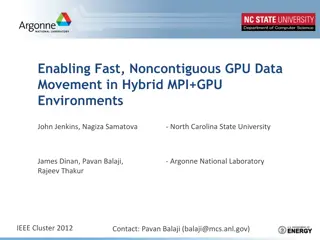Java Allocation and C2
Java object allocation and escape analysis play crucial roles in memory management and performance optimization within the Java Virtual Machine (JVM). This comprehensive overview covers topics such as object vs. scalar allocation, object allocation mechanisms, hotspot escape analysis, ideal and conn
2 views • 22 slides
Wall Object Elijah | Houseofmishka.co.uk
Discover the unique and emotional touch of Houseofmishka.co.uk Wall Object Elijah. Elevate your home decor with our handcrafted pieces.\n\n\/\/houseofmishka.co.uk\/product\/wall-object-elijah\/
3 views • 1 slides
Understanding Object-Oriented Software Engineering Principles
Explore the concepts of inheritance, generalization/specialization, UML representation, object/class relationships, multiplicity notations, and aggregation in object-oriented software engineering. Learn how methods and attributes can be inherited, grouped, and reused among classes, and understand th
0 views • 30 slides
Establishing Safety Standards in Non-Movement Areas at Smith Reynolds Airport
This guide outlines the purpose, definitions, rules, and safety measures for operating vehicles in non-movement areas at Smith Reynolds Airport. It emphasizes standardized ground movement practices to ensure the safety of airport patrons, reduce the risk of injury, and maintain a high level of safet
1 views • 12 slides
Understanding Word Order in Different Languages
Explore the fascinating world of word order in languages. Discover how different languages arrange words in various ways, such as Subject-Verb-Object (SVO), Subject-Object-Verb (SOV), and more. Delve into the diversity of word orders for subjects, objects, and verbs, and uncover how language structu
2 views • 31 slides
Object-Based Programming in Python: Exploring Classes and Constructors
Understanding object-based programming in Python involves creating classes with attributes and methods to build objects. By utilizing class constructors, you can initialize objects with specific values, allowing for unique instances with distinct characteristics. This tutorial covers the fundamental
2 views • 16 slides
Understanding Object-Oriented Programming Concepts
Object-oriented programming enables the effective development of large-scale software and GUIs by defining classes to represent entities in the real world as objects with unique identities, states, and behaviors. Objects have data fields representing their properties and methods defining their actio
2 views • 70 slides
Exploring Motility in Prokaryotes: Flagellar, Spirochaetial, and Gliding Movements
Delve into the fascinating world of bacterial motility through three types of movements in prokaryotes: flagellar movement driven by rotating flagella, spirochaetial movement with flexible axial fibrils, and gliding movement observed in certain bacteria on solid surfaces. Additionally, discover how
1 views • 14 slides
Understanding Data Modeling vs Object Modeling
Data modeling involves exploring data-oriented structures, identifying entity types, and assigning attributes similar to class modeling in object-oriented development. Object models should not be solely based on existing data schemas due to impedance mismatches between object and relational paradigm
0 views • 17 slides
Understanding Position, Motion, and Displacement in Physics
Position in physics refers to a place or location within a coordinate system, crucial for describing an object's motion through time. It involves factors like observer frame, coordinates, and whether the object is at rest or in motion. Motion is defined by an object's position, speed, direction, and
0 views • 15 slides
Khilafat Movement in India: A Historical Perspective
The Khilafat Movement was a significant event in Indian political history, triggered by the British not fulfilling promises made to protect Turkey during World War I. The movement aimed to safeguard Turkey's holy places, restore its territories, and revive the Ottoman Empire. Despite efforts, includ
0 views • 30 slides
Understanding the Interaction of Light with Objects
When light strikes an object, it can be reflected, transmitted, or absorbed, depending on the material of the object. Transparent materials allow light to pass through, translucent materials scatter light, and opaque materials absorb and reflect light. The color of objects is the color they reflect,
6 views • 17 slides
Understanding Object Behaviors and Statechart Diagrams in Software Design
Object behaviors and UML statechart diagrams play a crucial role in software requirements and design. State machines, transitions, events, and states are essential concepts in modeling object behavior in response to external events. By utilizing UML statechart diagrams, one can effectively represent
0 views • 23 slides
Understanding Relative Velocity and Acceleration in Physics
Relative velocity is defined as the velocity of an object in the rest frame of another object, and it can be negative depending on the difference in velocities. The need for using relative velocity lies in determining if an object is at rest or moving. The formula for relative velocity involves the
1 views • 25 slides
Overview of Quit India Movement and its Phases
The Quit India Movement was a significant event in India's struggle for independence, marked by various factors leading to its emergence, including the demise of the Civil Disobedience Movement and the rise of nationalist sentiments. The movement escalated in response to the outbreak of World War II
1 views • 9 slides
Understanding Object-Oriented Programming (OOP) in Python
Python is a versatile programming language that supports various programming approaches. Object-Oriented Programming (OOP) is a popular method in Python where objects are created to solve programming problems. OOP in Python focuses on creating reusable code, following the principle of DRY (Don't Rep
1 views • 35 slides
Understanding Object Modeling in Software Development
Object modeling is a crucial concept in software development, capturing the static structure of a system by depicting objects, their relationships, attributes, and operations. This modeling method aids in demonstrating systems to stakeholders and promotes a deeper understanding of real-world entitie
1 views • 65 slides
The Black Awakening: Challenges and Triumphs in African American Civil Rights Movement
In the early 20th century, influential leaders like Booker T. Washington and W.E.B. Du Bois led the fight for political and civil equality for African Americans. Despite facing obstacles such as segregation and disenfranchisement, groups like the Niagara Movement and NAACP emerged to promote racial
0 views • 7 slides
Understanding Object-Oriented Design Principles
Explore the core concepts of object-oriented design, including objects, classes, and the object-oriented paradigm. Learn about the relationship between objects and classes, and how they form the building blocks of software development. Gain insights into class components, attributes, and methods, an
0 views • 18 slides
Understanding Forces: What Makes a Moving Object Slow Down and Stop?
The lesson delves into the forces that cause a moving object to slow down and eventually stop. It explores the concepts of friction and surface texture using real-world examples and data analysis. Students investigate patterns in object movement on different surfaces and make predictions about the i
0 views • 16 slides
Configuration Examples for IP SLA with Object Tracking
Learn how to configure and troubleshoot IP SLA with Object Tracking using detailed examples for Static Routing, HSRP, and Policy Based Routing. Find out where Object Tracking can be implemented and when not to use it in various network scenarios. Understand the configuration components, including de
2 views • 17 slides
The Quit India Movement 1942-1945: An August Movement
The Quit India Movement, also known as the August Movement or Do or Die Movement, was a mass protest on nonviolent lines in India from 1942 to 1945. Initiated by the Indian National Congress, it called for an immediate end to British rule in India. Led by leaders like Mahatma Gandhi, the movement ai
0 views • 16 slides
The Quit India Movement: A Pivotal Moment in India's Independence Struggle
The Quit India Movement, also known as the India August Movement, was a key event in India's fight for independence led by Mahatma Gandhi in 1942. This movement urged the British to grant India independence through peaceful non-violent protests. It called for an immediate end to British rule, the fo
0 views • 15 slides
Understanding Object-Oriented Programming (OOP) Concepts in Chapter 8
Delve into the world of Object-Oriented Programming (OOP) through Chapter 8 of 'Essential Computational Thinking' by Dr. Ricky J. Sethi. Explore how classes and objects form the backbone of OOP, how messages are sent between objects, and the difference between regular and object reference variables.
0 views • 29 slides
Understanding Levels of Object Recognition in Computational Models
Explore the levels of object recognition in computational models, from single-object recognition to recognizing local configurations. Discover how minimizing variability aids in interpreting complex scenes and the challenges faced by deep neural networks in achieving human-level recognition on minim
0 views • 29 slides
Understanding Direct Objects and Direct Object Pronouns
Direct objects receive the direct action of the verb, and when they are people or domesticated animals, the personal "a" is used. Direct object pronouns replace the object to avoid repetition. Learn more about the personal "a", its usage, and how to identify direct objects in sentences.
0 views • 53 slides
Understanding Advanced Object-Oriented Design and the Strategy Pattern
Delve into the intricate world of Object-Oriented Design (OOD) with a focus on the Strategy Pattern. Explore the fundamental principles of OOD, such as encapsulation, abstraction, and the Single Responsibility Principle. Discover how objects interact through messages and how to ensure each class has
0 views • 22 slides
Exploring L=A=N=G=U=A=G=E Poetry Movement of the Late 1960s and 1970s
The L=A=N=G=U=A=G=E poetry movement emerged in the late 1960s and early 1970s as a response to mainstream American poetry, focusing on diverse communities in San Francisco and New York. This avant-garde movement emphasized the use of language, drawing readers' attention to the nuances of meaning. No
0 views • 6 slides
The Civil Rights Movement and Terence O'Neill's Demise (1964-1969)
The Civil Rights Movement in Northern Ireland, spearheaded by organizations like the Campaign for Social Justice (CSJ) and the Northern Ireland Civil Rights Association (NICRA), aimed to address widespread discrimination against Catholics. The movement advocated for electoral reform, an end to housi
0 views • 10 slides
Understanding Subject and Object Pronouns
Learn about subject and object pronouns, their usage in sentences, and examples to differentiate between them. Subject pronouns are used as the subject of a sentence, while object pronouns function as the object of a verb or preposition. Understand when to use pronouns like "I" or "me," "they" or "t
0 views • 13 slides
Understanding Direct Objects and Direct Object Pronouns in English and French
Explore the concepts of direct objects and direct object pronouns in English and French languages. Learn how direct objects are used in sentences, the role of direct object pronouns in avoiding repetition, and the differences in sentence structure when using object pronouns in French. Discover commo
0 views • 24 slides
Exploring Suffrage Movement Through Scenes and Questions
This comprehensive content presents a structured exploration of the suffrage movement through questions, images, and scenes from a play set in the early 1900s. Readers are encouraged to ponder reasons behind voting, attitudes towards the movement, and the impact of protest actions. The content delve
0 views • 13 slides
Understanding the Difference Between Aggregation and Composition in Object-Oriented Programming
Aggregation and Composition are two important concepts in object-oriented programming. Aggregation refers to a 'has-a' relationship where the contained object can survive independently, while Composition indicates that the member object is part of the containing class and cannot exist separately. Th
0 views • 15 slides
Metrics and Lessons Learned for Object-Oriented Projects
This chapter discusses various metrics and lessons learned for object-oriented projects, including the use of major OO metrics, Lorenz's metrics, IBM's Object Oriented Technology Council recommendations, and the CK metrics suite. The CK metrics suite covers six OO design and complexity measures, suc
0 views • 17 slides
Fundamentals of Object-Oriented Programming in Java
Object-Oriented Programming (OOP) is a methodology that simplifies software development by using classes and objects. This paradigm includes concepts like Object, Class, Inheritance, Polymorphism, Abstraction, and Encapsulation. Other terms used in OOP design include Coupling, Cohesion, Association,
0 views • 54 slides
Shy Robot Programming Challenge: Logic-Based Autonomous Robot
The Shy Robot is an autonomous robot equipped with two IR sensors to avoid obstacles. Its behavior is determined by a logical control system - moving backward if both sensors detect an object, turning right if only the left sensor detects an object, turning left if only the right sensor detects an o
0 views • 5 slides
Challenges and Evolution of the Civil Rights Movement
The Civil Rights Movement faced new challenges in the 1960s, with urban African Americans struggling with racism, economic disparities, and social issues. The Kerner Commission highlighted systemic racism, while incidents like the Watts Riot underscored ongoing tensions. The movement also saw a shif
0 views • 11 slides
Understanding Momentum in Physics
Momentum, first introduced by Isaac Newton, is symbolized by the letter p and signifies inertia in motion. It is calculated as mass multiplied by velocity (p = m * v) and has the unit of kg * m/s. The amount of momentum depends on the object's mass and speed. A moving object has more momentum if eit
0 views • 18 slides
Understanding Object Properties and Hierarchy in Excel VBA
Exploring how to activate, manipulate, and work with different Excel object collections such as Workbooks, Worksheets, and Charts in VBA. Learn to navigate object hierarchies, access specific objects, and manage object properties to enhance your Excel macro development skills.
0 views • 16 slides
Fast Noncontiguous GPU Data Movement in Hybrid MPI+GPU Environments
This research focuses on enabling efficient and fast noncontiguous data movement between GPUs in hybrid MPI+GPU environments. The study explores techniques such as MPI-derived data types to facilitate noncontiguous message passing and improve communication performance in GPU-accelerated systems. By
0 views • 18 slides
